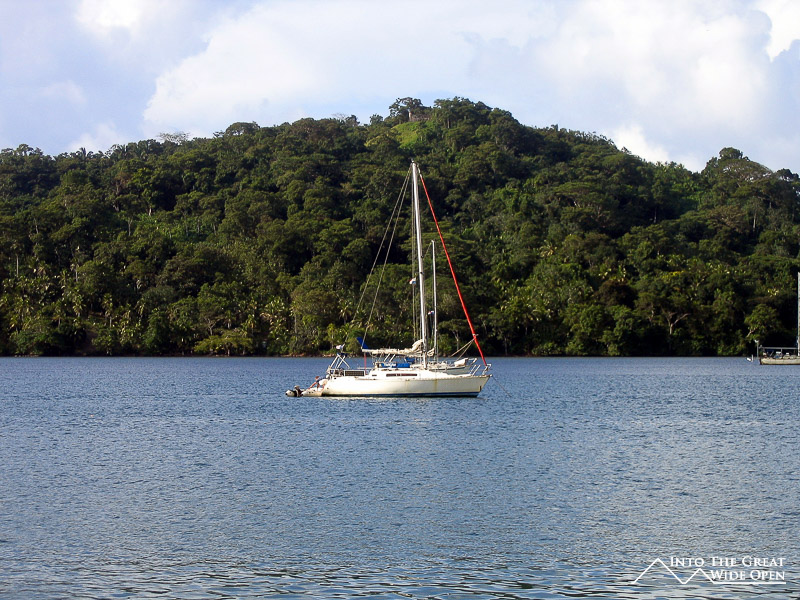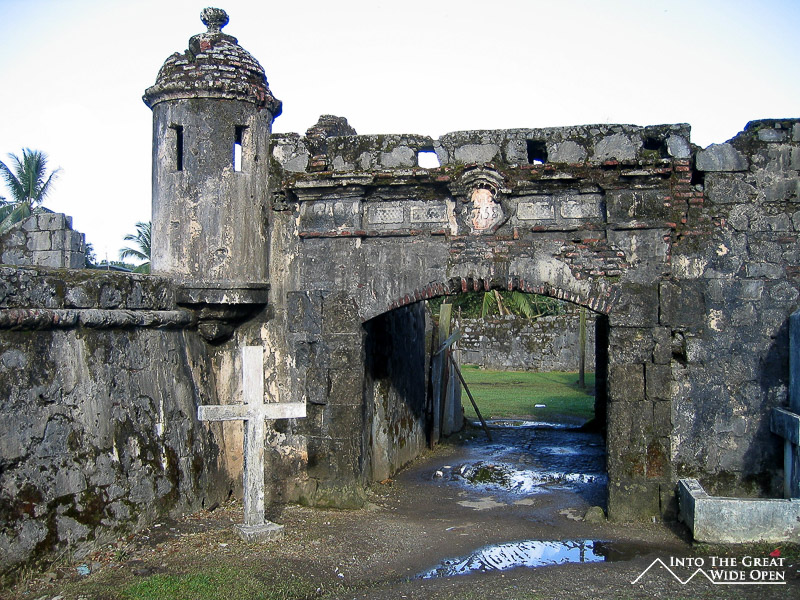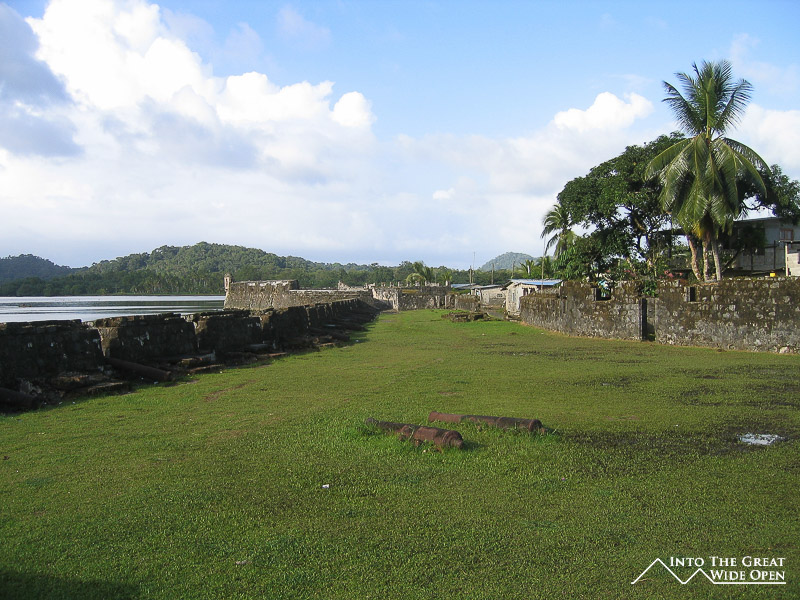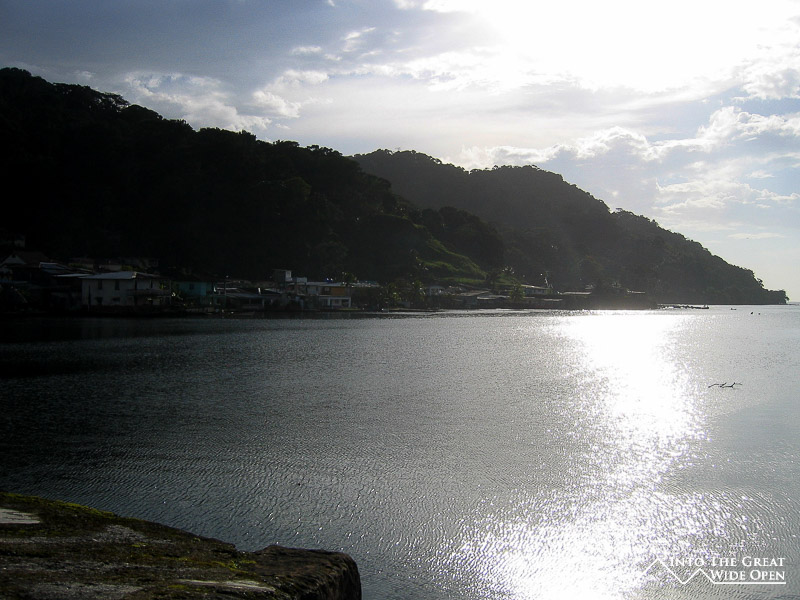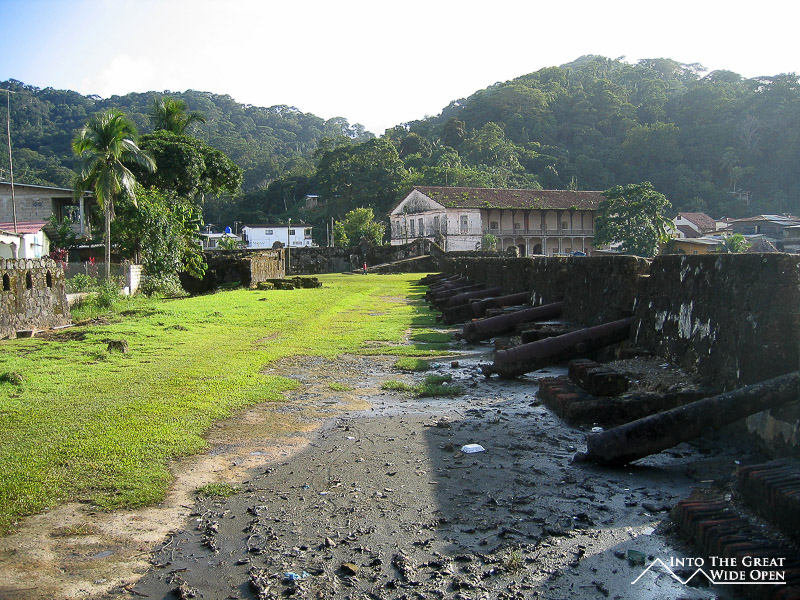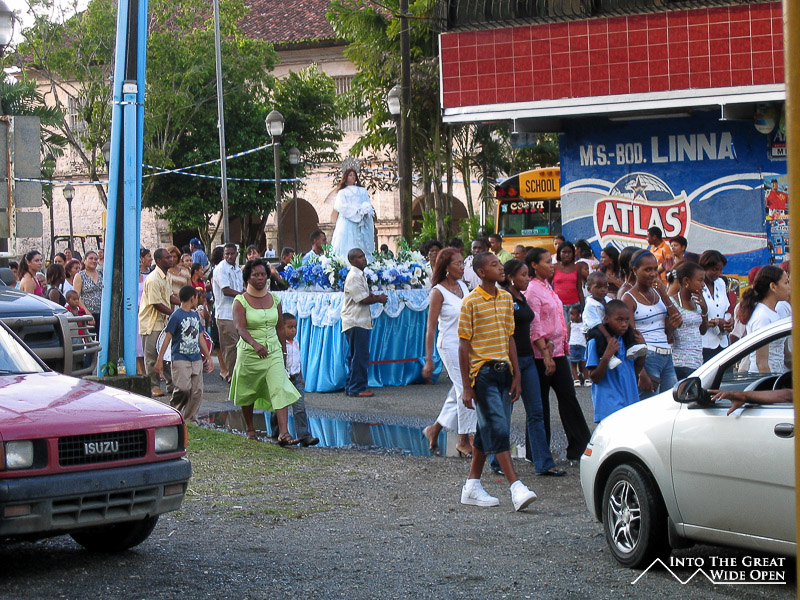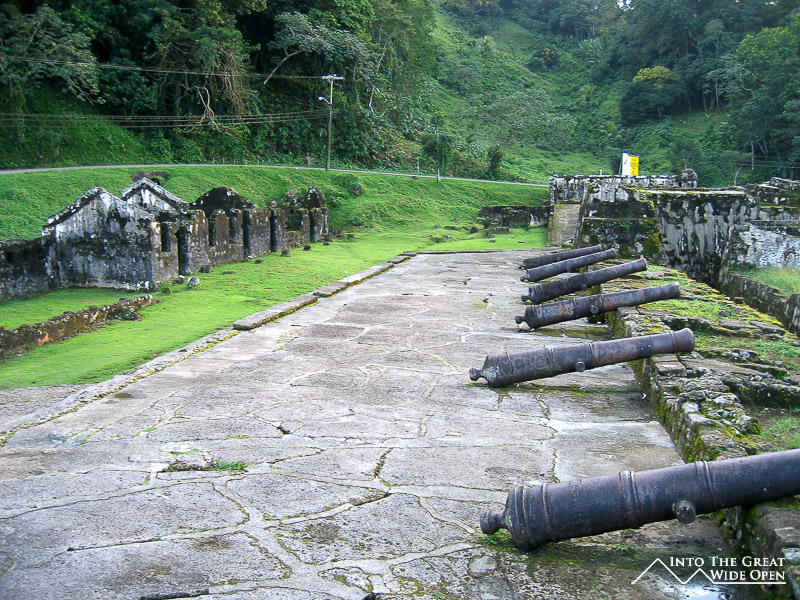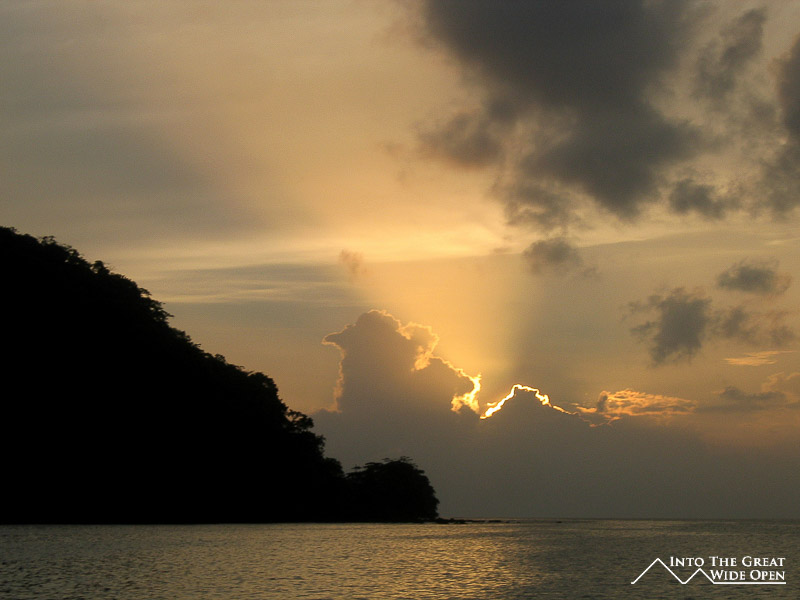Portobelo, Panama
Old Forts and a Parade
December 8, 2007
We draw our own designs
Fortune has to make that frame
- Rush
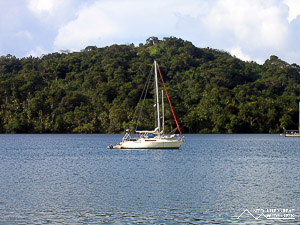
I spent most of the three hour bus ride to Portobelo in the back of an uncomfortable antique American style school bus trying to sleep a little as the restless sleep I had gotten now seemed very inadequate. The complete lack of shocks and the absence of roadway improvements made this a daunting task that I was forced to abandon as the road petered out and we neared Portobelo.
Portobelo is literally the end of the line on the Atlantic coastal road in Panama. It is a UNESCO World Heritage site mostly due to two aging forts that once guarded the natural harbor. In its prime it must have been a bustling port, but now it is a sleepy little town at the end of the road. The traffic from the Panama Canal heads through Colon, a less than savory place with all the problems that large scale multi-national ship traffic, proximity to major drug routes, and a free trade zone will usually bring. I had been advised to avoid Colon from anyone that had been there and had changed buses at an intersection to avoid traveling through the city. I was later told a story by an American I met in Colombia who had traveled through Colon. He told me that he was reading in his hotel room when he heard the sounds of fireworks. He rushed to his balcony to see the show but seeing nothing up above in the sky his attention was drawn by the noises down below on the street. In the middle of the street was an ongoing gun battle, wild West style, between two men with pistols. Other onlookers had filled the mezzanine sections of the surrounding balconies, watching this Broadway street theatre intently. Fortunately with Colon to draw this type of activity Portobelo has been left to its own slow pace.
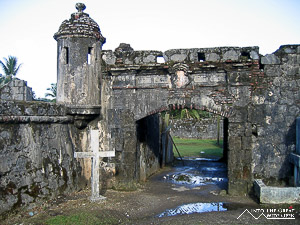
When I arrived at Portobelo the sailboat was waiting in the harbor, one of a handful of boats. Along with the others we met the captain to drop off our stuff so that he could ferry it over to the boat. The captain was from Argentina but had married a Colombian girl so he made the crossing from Colombia to Panama enough times that he needed to get a new passport every two years from all the stamps. We had a few hours before we were to set sail so I had a chance to wander through the town, see the remnants of the two ancient forts, and eat one last meal before days at sea. Most of the town was closed because it was Mother’s Day but I was able to find one restaurant and had some strange whole local fish and rice that was none too good and riddled with little bones. While I was eating, the ragtag Mother’s Day parade rolled down the main street with people unevenly carrying a small religious statue and loud blaring music of poor quality.
After dinner it was time to sail. Joining me on the boat would be a Swiss couple, a German guy, and two Swiss girls and an Australian girl from the hostel I had stayed at. In the spirit of capitalism the boat was a bit undersized for that many people, and lacking much sailing experience, or any really, I had no idea just how small the boat was. Once on board I had a slightly better idea. There was one small “room,” or rather a compartment, at the front of the boat, one smaller compartment at the back and two benches on either side in the middle that were forward of the tiny kitchen and bathroom. With all our passengers it would be close quarters for the trip. Contrasting the size of our boat with the vastness of the ocean as I had seen it from the 35,000 foot vantage point of an airplane window I could easily understand how people get lost at sea. Perhaps not the best perspective to be reminded of before undertaking a journey like this but filled with the excitement of a new adventure none of this garnered more than a moment’s thought.
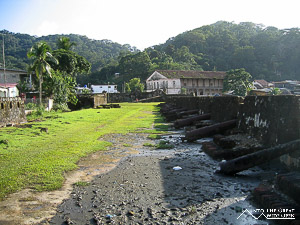
As I watched the day fade into a glorious sunset from the deck of the boat we began to ease out of the calm harbor and into the Atlantic. Darkness washed over the boat and the few and fleeting lights of Portobelo dropped into the distance. With clouds covering the night the blackness engulfed us. Beyond the few lights of Portobelo a huge glow hovered to the northwest, the lights of Panama City, well over a hundred miles away. Even in this remote spot the natural darkness was ruined by the urban sprawl of the city. The spread of humanity and civilization has made light pollution a growing problem and provides yet another reminder of the expanding footprint that we leave.
In the midst of this semi-darkness the wind began to pick up and the water became quite choppy. Suddenly, eating that fish, skin and all, didn’t seem like a good idea. Quickly depositing it back in the ocean seemed to help a little bit, at least temporarily. I was the first one to lean over the side of the boat that night but one by one all but two others would follow suit. The increasing wind and rising waves saw to it that almost everyone felt the effects. The light winds and choppiness continued to increase and it started to rain. The rain drove all of us inside the cabin of the boat. For me that combination of seasickness and confined spaces with stale air was less than ideal; if you throw in the rapidly pitching boat, it was a dangerous trifecta. After throwing up into a plastic bag a few times I gave up and left to sit outside in the rain. Luckily it was the Caribbean and it never drops below 75 degrees so it wasn’t too conducive to hypothermia. Even sitting up outside didn’t abate the seasickness. I was forced to lie flat on my back on the bench in the back of the boat as the rain fell over me, holding on to prevent from being thrown about. By now the wind and waves had picked up to the point where we were facing 15-20 foot waves. If you’ve never looked right into the black face of a wave of that size then you don’t know how intimidating it can be. If you’re in the middle of the ocean in a small sailboat at night then you might want to factor that in to the level of intimidation. Our boat climbed the steep inclines of the faces of the waves and then plowed down the steep descents on the other side. Over, and over, and over again. Occasionally the timing would change and the waves would break on the bow sending saltwater washing over the back of the boat and all over me. Periodically we tacked, shifting the sail to other side to stay on course, forcing me to get up and move to the other side of the boat. The night couldn’t end soon enough, nor would it.
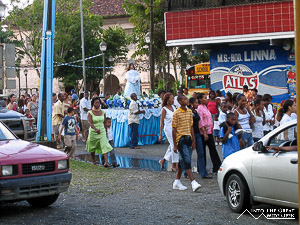
The rough weather meant more than just being uncomfortable; it also meant that we weren’t making any progress. We were supposed to reach El Porvenir that night and drop anchor there. Of course now we were nowhere close and getting there no time soon. The constant barrage of waves and wind had caused our captain to consider turning back but we had already come a bit too far. The rough waves and lurching boat had dumped and mixed all the possessions inside of the boat. Sometime in the middle of night we began to see the lights of another boat drawing closer and closer behind us. In the middle of this storm and given our location this kind of scared us. We had visions of modern day pirates or drug runners pulling up to rob or kidnap us. The other boat continued to move in and those struggling in the cabin below heard the radio chirp repeatedly. They alerted the captain who went below to check on it. He emerged a few minutes later and told us that the other boat was the Panamanian coast guard. They had been looking for a boat that had issued a distress signal but had then lost radio contact with them. They thought that we were the missing boat. Discovering otherwise they turned away to continue the search. It was comforting to know that, if necessary, help might be out there.
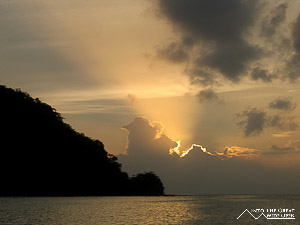
I continued to be pounded by the rain, wind, and waves but lying down helped immensely and I was no longer throwing up, not that there was anything left of course. After an eternity of this punishment the winds and waves died down and we were able to make some progress. The inky darkness was breached by the first rays of sun when the rain stopped falling. We were close to El Porvenir but we needed to wait for calmer waters and daylight in order to navigate the narrow deep water channels formed by the low lying reefs surrounding the island. After sunrise we slipped into the harbor and dropped anchor for a well-deserved rest. What should have been a four hour ride had taken almost fourteen hours.
